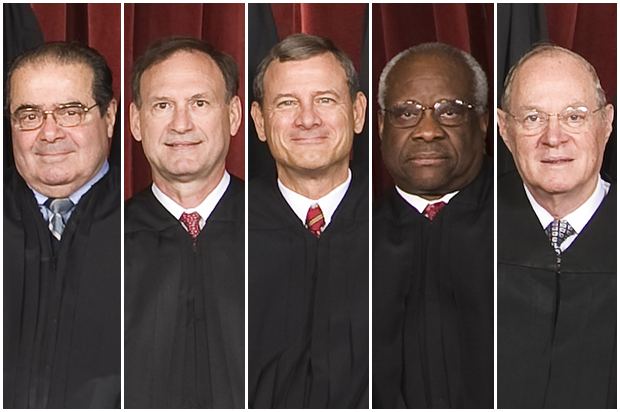Although Harris v. Quinn stood in the shadows of the Hobby Lobby case this session, both decisions dealt with women’s rights, since the home healthcare workers affected by it are disproportionately low-paid women. The Supreme Court’s decision in the case Monday made life harder for unions representing some of the lowest-paid workers in one of the fastest-unionizing sectors, but left most of public sector collective bargaining law intact.
At issue was an Illinois decision to let home care workers who are paid by clients with public funds be represented by a union. Workers doing such jobs in hospitals and other institutional settings have union representation, but with a growing consensus that care at home is more humane and less expensive, the number of home care jobs is projected to jump 70 percent in the next decade. Individuals working in private homes had no way to unionize, and no larger “employer” with whom to negotiate pay and working conditions, so a growing number of states have made a public agency their “employer of record.”
As is traditional in the public sector, the home care workers who didn’t want to join the union were required to pay a smaller portion of dues anyway, since their wages and working conditions would improve thanks to agreements negotiated by the union. (In fact, since the workers unionized, hourly wages climbed from under $5 in 2003 to $13 this year.)
Plaintiff Pamela Harris, who cares for her disabled son at home, sued to stop the union from deducting dues. Describing herself as a “mom” fighting to stop “the threat of unionization in a family home” on Fox News and elsewhere, she insisted “not a penny of Medicaid funding intended to help provide care for disabled men and women should be taken away and given to the union.” While some home care workers are family members, most are not, and disability rights groups along with advocates for the elderly have supported the union, arguing that better wages reduce turnover and noting that unions have also funded classes to help members better care for clients.
The plutocrat cartel known as the National Right to Work Committee, backed by the Kochs, the Waltons and other conservative anti-union funders, joined Harris. But where her case started out targeting only her category of workers in Illinois, the NRWC Legal Defense Foundation blew it up to try to get the court to overturn the landmark 1967 Abood v. Detroit Board of Education, which held that public employees who don’t want to join a union must still pay representation fees, as long as the fees don’t pay for political activity.
That bid failed; Justice Samuel Alito said the court’s decision left Abood intact, but limited its reach “to full-fledged state employees” as opposed to “partial public employees” like Harris. He was joined in the majority opinion by Chief Justice John Roberts and Justices Clarence Thomas, Antonin Scalia and Anthony Kennedy. But Alito left the door open to a future challenge to public sector unions, calling the “Abood court’s analysis…questionable on several grounds” and “anomalous.” As of late afternoon Monday, unions still weren’t sure how far beyond the specifics of Pamela Harris’s complaint the ruling would apply.
Writing in dissent, Justice Elena Kagan noted that the court declined to overturn Abood. “The good news out of this case is clear: The majority declined that radical request. The Court did not, as the petitioners wanted, deprive every state and local government, in the management of their employees and programs, of the tool that many have thought necessary and appropriate to make collective bargaining work. The bad news is just as simple: The majority robbed Illinois of that choice in administering its in-home care program.”
Unions like SEIU and AFSCME decried the decision, but so did advocates for the elderly and disabled. “Today’s decision hurts millions of low-wage workers and the people they serve, often the most frail and vulnerable in America,” said Richard Fiesta, executive director of the Alliance for Retired Americans.
On Fox News, Pamela Harris applauded the court’s ruling. “It’s exactly what we wanted,” she said. Noting that the court declined to apply its decision to all public employee unions, she parted company from her friends at NRWC. “That was never our objective,” she said.
Some court observers see the conservative majority moving toward Abood, but slowly. “The court’s opinion in Harris is very much in the mold of opinions by the conservative Roberts Court majority: Issue a relatively narrow ruling on the conservative side, but lay the groundwork for a broader conservative ruling in the future,” Rick Hasen, a law professor at the University of California, Irvine, told Mother Jones. “In Harris, the court sets itself down the path of overruling Abood but does not take that step yet.”

